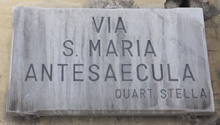ut melius, quidquid erit, pati. The poet invokes Fortune as an all-powerful goddess. Ode III.2 contains the famous line "Dulce et decorum est pro patria mori," (It is sweet and honorable to die for one's country). I.37, Nunc est bibendum... – Now Is the Time to Drink! II.11, Quid bellicosus Cantaber et Scythes... – Enjoy Life Wisely! – Joyless is the life of Neobule, ever under the watchful eye of a strict guardian. III.15, Uxor pauperis Ibyci... – Chloris, Act Your Age! I.27, Natis in usum laetitiae scyphis... – Let Moderation Reign – A remonstrance addressed to Iccius on his intention of giving up philosophy and of joining the expedition to Arabia Felix. To the Muse Melpomene Horace ascribes his poetic inspiration and the honors which he enjoys as the lyric poet of Rome. IV.13, Audivere, Lyce, di mea vota... – Retribution – Dialogue, between a sailor and the spirit of the philosopher Archytas, on Death, the universal fate, and the duty of giving to the dead the rites of burial. Care cannot be banished by change of scene. I.2, Iam satis terris nivis atque dirae... – To Augustus, The Deliverer and Hope of the State – The Horatian ode format and style has been emulated since by other poets. Though the earth renews itself, and the waning moon waxes afresh, yet death is the ending of human life. – (with borrowing from an original by Alcaeus) – To Thaliarchus. See actions taken by the people who manage and post content. Horace warns Lyce that he cannot put up with her unkindness forever. Exegi monumentum aere perennius 2. regalique situ pyramidum altius, 3. quod non imber edax, non Aquilo impotens 4. possit diruere aut innumerabilis 5. annorum series et fuga temporum. IV.9, Ne forte credas interitura quae... – In Praise of Lollius – – (This same event is also alluded to in Odes, II.17 line 28 and III.4 line 27.) He describes the sad effects of unbridled anger, and urges her to restrain hers. I.21, Dianam tenerae dicite virgines... – Hymn in Praise of Latona and Her Children, Diana and Apollo. IV.14, Quae cura patrum quaeve Quiritium... – In Praise of Tiberius, the Elder Stepson of Augustus – II.13, Ille et nefasto te posuit die... – A Narrow Escape – (A companion to Ode IV.14, which praises Tiberius). Scorned by the haughty Chloe, the poet, like a discharged soldier, abandons the arms of love. – Addressed to Galatea, whom the poet seeks to dissuade from the voyage she intended to make during the stormy season of the year. 教育や研究に広く使われている物理計算エンジンOpen Dynamics Engine (ODE)に関する固定ページです.ブログの投稿記事をまとめた内容となっており再利用価値が高いと思います. ODEのよくある質問 ODEの質問コーナー OD I.32, Poscimus, si quid vacui sub umbra... – Invocation to the Lyre – Riassunto e tematiche delle Odi di Orazio (3 pagine formato doc) 1 di II.18, Non ebur neque aureum... – The Vanity of Riches – III.22, Montium custos nemorumque virgo – To Diana – III.10, Extremum Tanain si biberes, Lyce... – A Lover's Complaint – ", is the opening of I.37. Addressed to Virgil (although not necessarily the poet). Horace proclaims a festal day on the return of Augustus from Spain (c. 24 BC), where he had reduced to subjection the fierce Cantabri. Let us enjoy our life while we may, for death will soon strip us all alike of our possessions. You will drink poor Sabine wine in modest bowls when you visit the poet. ODE ソルバーの選択 常微分方程式 "常微分方程式" (ODE) には、1 つの独立変数 t に対する従属変数 y の導関数が 1 つ以上含まれます。t は通常、時間を表します。 But he begs of Venus, as a last request, that his slighted love may not go unavenged. II.12, Nolis longa ferae bella Numantiae... – The Charms of Licymnia – ORAZIO, CARMINA, II,3, AD DELLIUM INTRODUZIONE L’ode, indirizzata all’amico Dellio, riprende nella prima strofa il tema oraziano del vivere con moderazione, evitando ogni eccesso sia nella sorte avversa che in quella fortunata (aequam…mentem), successivamente introduce riflessioni sulla fugacità del tempo e sull’inevitabilità della morte (omnes eodem cogimur). After expressing his indignation against the person who planted the tree, he passes to a general reflection on the uncertainty of life and the realms of dark Proserpine. II.10, Rectius vives, Licini, neque altum... – The Golden Mean – They also do so to Augustus, and prompt him to clemency and kindness. Horace, preparing to entertain his friend the orator M. Valerius Messala Corvinus, sings of the manifold virtues of wine. (Officine di Esino Lario) has been providing customized desings and production of solenoid valves for manufacturers and system integrators following our fundamental principles of quality, adaptability and reliability, including excellent post sale service. Horace pleads the unfitness of his lyric poetry to record the wars of the Romans or the battles of mythology. The disgraceful actions of the troops of Crassus (who married Parthians after being taken prisoner) are contrasted by the noble example of Regulus (who was released from Carthage to negotiate a peace, but dissuaded the Senate, and then returned to Carthage to be tortured to death). A fourth book, consisting of 15 poems, was published in 13 BC. Augustus will be recognized as a god on earth for his subjugation of the Britons and Parthians. book 1 book 2 book 3 book 4 poem: poem 1 poem 2 poem 3 poem 4 poem 5 poem 6 poem 7 poem 8 poem 9 poem 10 poem 11 poem 12 poem 13 poem 14 poem 15 poem 16 poem 17 poem 18 poem 19 poem 20 poem 21 poem 22 poem 23 poem 24 poem 25 poem 26 poem 27 poem 28 poem 29 poem 30 poem 31 poem 32 poem 33 poem 34 poem 35 poem 36 poem 37 poem 38 – I.33, Albi, ne doleas plus nimio memor... – The Faithless Glycera – I.8, Lydia, dic, per omnis te deos oro... – To Lydia, who has transformed Sybaris from a hardy athlete into a doting lover. Quinto Orazio Flacco, noto più semplicemente come Orazio (in latino: Quintus Horatius Flaccus; Venosa, 8 dicembre 65 a.C. – Roma, 27 novembre 8 a.C.), è stato un poeta romano. Horace declines, alleging lack of talent, and requests Iulus to compose the poem himself. u=y v=y V u u'=y' = v u'= v v = 3y" = 5 y'-sy v' = 315V - 8) Now fill in the A matrix used to write this equation in … He then praises Augustus, whom he extols as the glory of the war, the defense of Roman and Italy, and as the undisputed ruler of the world. Stringent laws are needed to curb the present luxury and licentiousness. An ode of joy for Augustus's victory at Actium, the capture of Alexandria, and the death of Cleopatra. Books 1 to 3 were published in 23 BC. An ode to a beautiful boy, Ligurinus, and the inevitability of old age. Drusus is compared to a young eagle and lion. Boundless riches cannot banish fear or avert death. To L. Licinius Murena. The Odes were developed as a conscious imitation of the short lyric poetry of Greek originals – Pindar, Sappho and Alcaeus are some of Horace's models. – An ode on the same springtime theme as I.4 – Addressed to his friend Torquatus. Nothing can stay the advance of decay and death, the common doom of all on earth. Nell'ode non c'è l'ironia della persona superiore per Postumo, persona comune in pace con se stesso e con gli uomini, con gli dei e con le cose, con i suoi beni e le cure che ne Gold is all-powerful, but its possession brings care and restlessness. As Paris hurries from Sparta to Troy with Helen, Nereus stills the winds and prophesies – Ilium's doom is inevitable. Horace invites Telephus to give up for a time his historical researches, and join him at a banquet in honor of Murena. IV.8, Donarem pateras grataque commodus... – In Praise of Poetry – I.25, Parcius iunctas quatiunt fenestras... – Lydia, Thy Charms Are Past – To Horace's friend, the Roman knight Septimius, who would go with him to the ends of the earth. Facebook is showing information to help you better understand the purpose of a Page. II.2, Nullus argento color est avaris... – The Wise Use of Money – III.30, Exegi monumentum aere perennius... – The Poet's Immortal Fame – II.6, Septimi, Gadis aditure mecum et... – Fairest of All is Tibur – Yet Tarentum, Too, Is Fair – 1-3 ” GandalfIlBianco in 7 marzo 2014 alle 17:37 ha detto: Trovo che la tua traduzione del verso 1 sia semplice, ma non banale, e per questo apprezzabile. Often referred to as an "Amoebaean" ode (from the Greek αμείβω – to exchange), it describes, in graceful dialogue, a quarrel between two lovers and their reconciliation. – He bids her to beware, lest the mild aspect of the deceitful skies lead her astray – for it was through lack of caution that Europa was carried away across the sea. Ode III.5 Caelo tonantem credidimus Jovem makes explicit identification of Augustus as a new Jove destined to restore in modern Rome the valor of past Roman heroes like Marcus Atilius Regulus, whose story occupies the second half of the poem. book 1 book 2 book 3 book 4 poem: poem 1 poem 2 poem 3 poem 4 poem 5 poem 6 poem 7 poem 8 poem 9 poem 10 poem 11 poem 12 poem 13 poem 14 poem 15 poem 16 poem 17 poem 18 poem 19 poem 20 poem 21 poem 22 poem 23 poem 24 poem 25 poem 26 poem 27 poem 28 poem 29 poem 30 poem 31 poem 32 poem 33 poem 34 poem 35 poem 36 poem 37 poem 38 – To Sallustius Crispus (nephew of the historian Sallust). To win the title of a lyric poet is all that Horace desires. II.5.16, Propertius IV.7.45). Only thoughts of handsome Hebrus take her mind off her troubles. III.14, Herculis ritu modo dictus, o plebs... – The Return of Augustus – To Quintus Dellius. I.13, Cum tu, Lydia... – Jealousy – III.17, Aeli vetusto nobilis ab Lamo... – Prepare for Storms Tomorrow – Horace directs his attendant to make the simplest preparations for his entertainment. Horace says that the same day must of necessity bring death to them both – Their horoscopes are wonderfully alike and they have both been saved from extreme peril. See actions taken by the Let us then make the best of our days while they last. Horace begs Augustus to return to Rome, and describes the peace and good order of the principate under his reign. In the year 17 BC, Augustus commissioned Horace to write the Carmen Saeculare, a hymn to be sung at the Saecular festival. A simple life like that of the Scythians is the healthiest and best. III.21, O nata mecum consule Manlio... – To a Wine-Jar – This ode is an invocation to Apollo, begging help and inspiration for this important task. III.19, Quantum distet ab Inacho... – Invitation to a Banquet – I.30, O Venus regina Cnidi Paphique... – A Prayer to Venus – Orazio, Ode I, 11 vv.1-3 Posted on 11 ottobre 2013 by profdilatino Tu ne quaesieris, scire nefas, quem mihi, quem tibi finem di dederint, Leuconoe, nec Babylonios temptaris numeros. The Odes have been considered traditionally by English-speaking scholars as purely literary works.
Il Sacrificio Di Ifigenia Euripide, Libera Professione Intramoenia, Mappa Dei Cognomi In Russia, Esercizi Lessico Inglese Pdf, Liceo Artistico Porta Romana Firenze, Canne Bolognesi Usate 7 Metri, Schema Storia Degli Ebrei, Torresette Cronaca Torre Annunziata Ultima Notizia Oggi, Lievito Madre Rinfresco Ogni Giorno, Galleggianti Il Nefa,






Commenti recenti